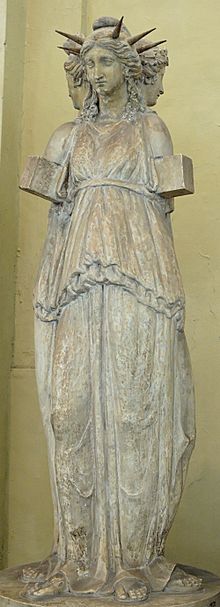Hekate
| Hecate | |
|---|---|
| Goddess of magic, crossroads, ghosts, and necromancy | |

The Hecate Chiaramonti, a Roman sculpture of triple Hecate, after a Hellenistic original (Museo Chiaramonti, Vatican Museums)
|
|
| Abode | Underworld |
| Symbol | Paired torches, dogs, serpents, keys, polecat, and daggers |
| Consort | Hermes, Helius, Mormo |
| Parents | Perses and Asteria |
| Offspring | Circe, Scylla, Aietes, Pasiphae, Empusa; Pan (in some accounts) |
| Roman equivalent | Trivia |
Hecate or Hekate (/ˈhɛkətiː/; Greek Ἑκάτη Hekátē) is a goddess in Ancient Greek religion and mythology, most often shown holding two torches or a key and in later periods depicted in triple form. She was variously associated with crossroads, entrance-ways, light, magic, witchcraft, knowledge of herbs and poisonous plants, ghosts, necromancy, and sorcery.
She appears in the Homeric Hymn to Demeter and in Hesiod's Theogony, where she is promoted strongly as a great goddess. The place of origin of her following is uncertain, but it is thought that she had popular followings in Thrace. She was one of the main deities worshiped in Athenian households as a protective goddess and one who bestowed prosperity and daily blessings on the family. In the post-Christian writings of the Chaldean Oracles (2nd–3rd century CE) she was regarded with (some) rulership over earth, sea and sky, as well as a more universal role as Saviour (Soteira), Mother of Angels and the Cosmic World Soul. Regarding the nature of her cult, it has been remarked, "she is more at home on the fringes than in the center of Greek polytheism. Intrinsically ambivalent and polymorphous, she straddles conventional boundaries and eludes definition."
The etymology of the name Hecate (Ἑκάτη, Hekátē) is not known. Suggested derivations include:
In Early Modern English, the name was also pronounced disyllabically (as /ˈhɛkɪt/) and sometimes spelled Hecat. It remained common practice in English to pronounce her name in two syllables, even when spelled with final e, well into the 19th century.
...
Wikipedia
